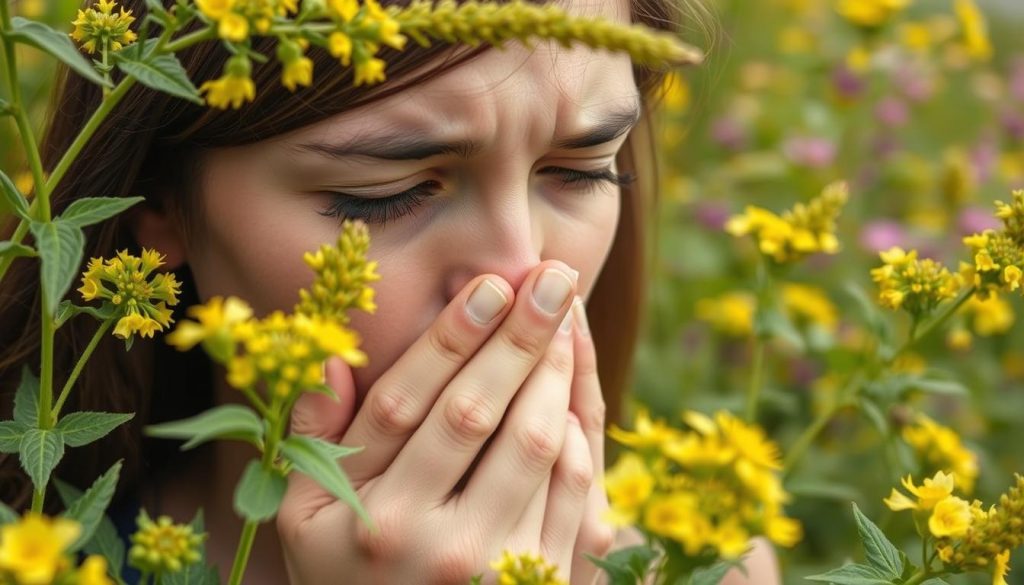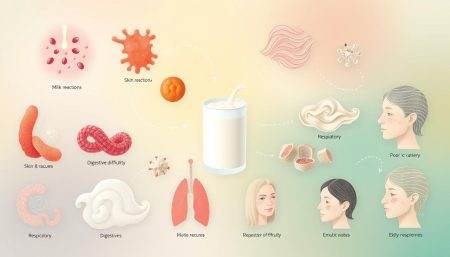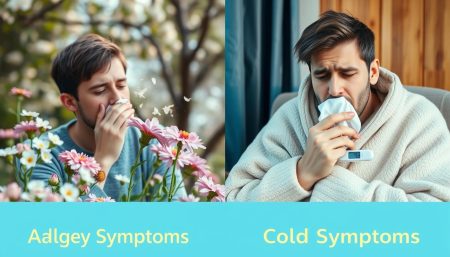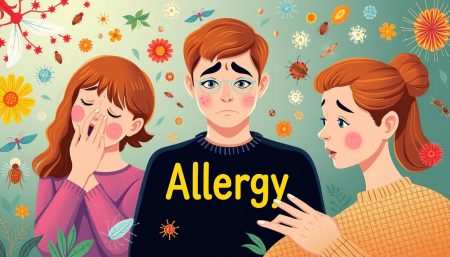As the leaves change and days get shorter, we know allergy season is coming. It brings a lot of ragweed pollen with it. For many, it’s important to know the signs of ragweed allergy to stay healthy.
A lot of people start to feel the effects of pollen allergies. It’s important to be alert during this time. But, the symptoms can be easy to miss, looking like just a cold.
This guide will help you spot and deal with these signs of ragweed allergies.
Key Takeaways
- Identifying early ragweed allergy signs is crucial for prompt management.
- Differentiating between pollen allergy indications and other seasonal ailments can prevent prolonged discomfort.
- Allergy season alertness helps in staying prepared and mitigating the impacts of allergies.
- Comprehending the subtleties of ragweed allergies can lead to better quality of life during peak seasons.
- Educational insight empowers individuals to take informed actions towards allergy relief and prevention.
Understanding Ragweed and Its Pervasiveness
Ragweed is often overlooked but has a big impact. It’s known for its strong allergens and wide spread. Knowing about ragweed plant characteristics, ragweed distribution, and allergy season timing helps prevent its pollen effects.
What Is Ragweed?
Ragweed belongs to the Asteraceae family. It grows in both rural and urban areas easily. Its pollen is small and light, traveling far by wind. This makes it a big problem for people with allergies.
Geographical Spread of Ragweed
Ragweed is found in many places. It grows in the Americas, Europe, and Asia. The US Midwest and East Coast have a lot of it. Urban and agricultural activities help it spread by disturbing the soil.
Seasonal Prevalence of Ragweed Pollen
Ragweed pollen is at its highest in late summer and fall. This is when allergy season is usually at its peak. The exact timing varies by location but is often from August to November. Keeping track of this is important for allergy sufferers.
| Month | Pollen Count Trend | Advisory Level |
|---|---|---|
| August | Increasing | Moderate |
| September | High | High |
| October | Declining | Moderate to High |
| November | Low | Low |
The Science of Ragweed Allergies
Ragweed allergies, also known as allergic rhinitis, are a big deal. They happen when the body’s immune system reacts to pollen. Knowing how this works helps us deal with allergies better.
How Ragweed Triggers Allergic Responses
Ragweed pollen is made up of tiny grains that plants use to fertilize. But when people with ragweed allergies breathe it in, their immune system gets confused. It thinks it’s fighting off an enemy.
This fight leads to the creation of antibodies. These antibodies are made to fight off the pollen. But when they meet the pollen, they release histamines. This causes inflammation and the symptoms we know as allergic rhinitis.
Immunological Explanation of Ragweed Allergies
Allergic rhinitis is all about the immune system reacting to pollen. Specifically, it’s the proteins in ragweed pollen that get the immune system going. It sees these proteins as threats, even though they’re not.
This mistake makes the immune system go on the defensive. It releases chemicals that make us sneeze, itch, and produce more mucus. These are the signs of an allergic reaction.
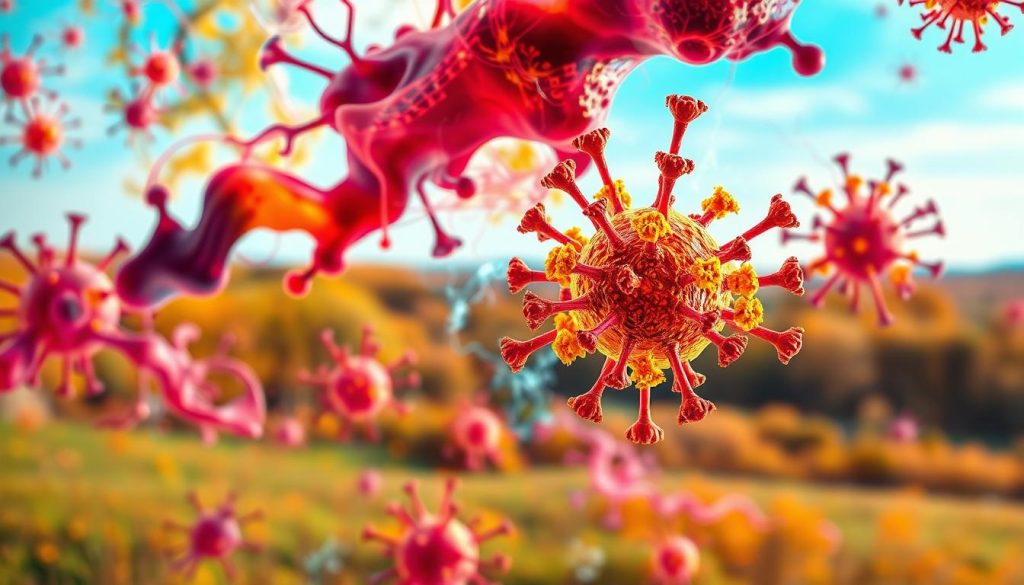
Think of your immune system like a security system that gets things wrong. It sees harmless pollen as a danger. So, it tries to get rid of it, just like it would with a real threat.
This is why we get symptoms like sneezing and itching. It’s all about how our immune system reacts to pollen.
In short, ragweed pollen and our immune system have a complex relationship. It ends in the symptoms we know as allergic rhinitis. By understanding this, we can find better ways to manage our allergies.
Ragweed Allergy Symptoms
It’s key to know the signs of a ragweed allergic reaction to act fast. Symptoms can range from mild to severe. They vary based on how sensitive someone is to ragweed pollen.
- Nasal congestion and sneezing
- Itchy, watery eyes
- Sore throat or hoarseness
- Coughing and wheezing
- Skin irritation or hives
- Fatigue and irritability
Each symptom of hay fever symptoms caused by ragweed can really mess up your day. It’s crucial to spot these signs early. This way, you can get the right help and feel better sooner.
| Symptom | Common Occurrence | Potential Complications |
|---|---|---|
| Nasal congestion and sneezing | Frequent | May lead to sinus infections |
| Itchy, watery eyes | Very common | Could cause conjunctivitis |
| Coughing and wheezing | Often in sensitive individuals | Possible asthma exacerbation |
| Skin irritation or hives | Less common | Can lead to severe allergic reactions |
| Fatigue and irritability | Common with prolonged exposure | Impacts mental health and well-being |
Managing a ragweed allergic reaction well can lessen symptoms. This helps you stay active and productive during allergy season.
Early Warning Signs of a Ragweed Allergy
Ragweed season is here, and knowing the early signs of an allergy is key. Spotting symptoms early can make a big difference. It helps avoid severe reactions and makes life easier.
First Indications Your Body Is Reacting
The first signs of a ragweed allergy might seem like a cold. But if they happen during ragweed season, think allergy. Look out for:
- Sneezing and nasal congestion
- Itchy, watery eyes
- Scratchy throat
Watch these signs closely. If they don’t go away or get worse, it might be an allergy.
When to Recognize the Urgency of Symptoms
Some allergies need fast action. Knowing when symptoms are serious can stop a big allergic reaction. Look out for:
- Difficulty breathing or wheezing
- Severe eye irritation
- Inability to do daily activities because of symptoms
These signs mean you need to see a doctor right away. They show a serious allergy.
It’s important to know these symptoms and how they affect your health. Take note of any changes during allergy season. Talk to your doctor about testing and managing your allergy. Recognizing symptoms can improve your life and protect your health for the long term.
Recognizing Seasonal Allergies vs. Common Colds
Distinguishing between seasonal allergies symptoms and common cold signs is key. Knowing the difference helps you manage and treat your condition better. It ensures you focus on the right remedies and avoid unnecessary treatments.
Distinguishing Between Allergy and Cold Symptoms
The cold-vs-allergy differentiation is mainly about symptom types. Allergies, like pollen reactions, cause itchy eyes, sneezing, and a runny nose with clear mucus. Colds, on the other hand, bring sore throats, body aches, and fever. The mucus in colds can turn yellow or green.
Duration of Symptoms: Allergies vs. Colds
The length of symptoms also helps tell them apart. Seasonal allergies can last weeks to months during pollen seasons. Cold symptoms usually go away in a week to 10 days. Knowing these patterns helps you decide when to see a doctor and what might be causing your symptoms.
Sneezing and Respiratory Challenges
When ragweed season starts, many people face uncomfortable symptoms. These include sneezing fits and ragweed respiratory effects. It’s important to understand these symptoms to find relief and know how to react to allergies.
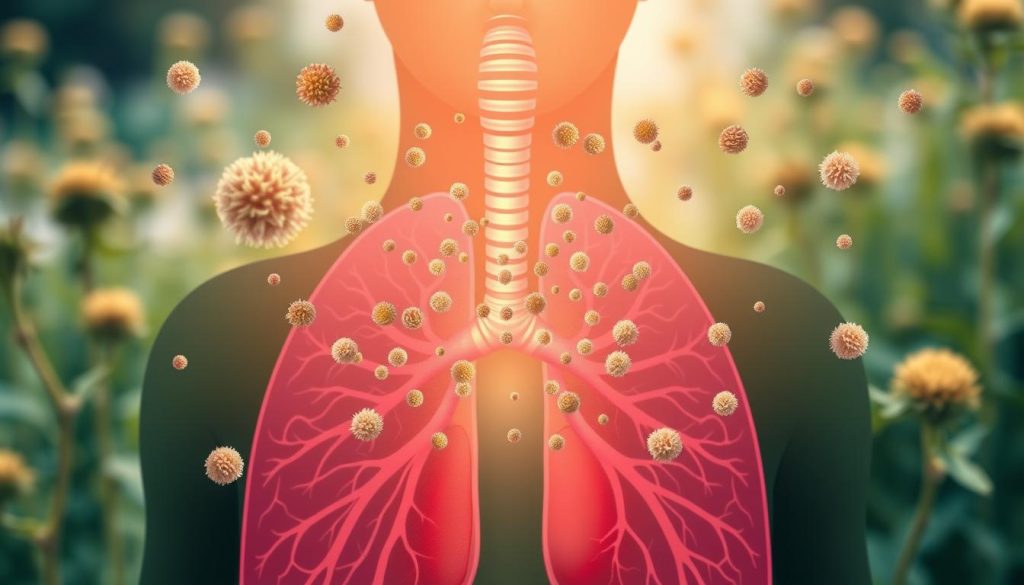
Sneezing is a way our bodies fight off airborne allergens. When ragweed pollen enters our noses, we sneeze to get rid of it. These sneezes can be annoying and disrupt our daily lives, showing the need for good management.
- The frequency and intensity of sneezing can escalate in environments with higher concentrations of ragweed pollen.
- Prolonged exposure can lead to more severe respiratory challenges, including sinus pressure and a congested chest.
Sneezing and other symptoms can also affect our mood. They can make us anxious and stressed, especially during seasonal changes.
Doctors may suggest antihistamines or allergy shots to treat symptoms. Seeing a doctor early can help manage ragweed respiratory effects better.
It’s not just about stopping sneezes. It’s also about reducing exposure to ragweed pollen. Using air purifiers, checking pollen counts, and staying indoors when pollen is high can help a lot.
By taking these steps, people with ragweed allergies can better manage their symptoms. This improves their life quality during allergy season.
Eye Irritations: More Than Just Itchy Eyes
Ragweed allergies can cause more than just stuffy noses. They often affect the eyes too. This part talks about allergic conjunctivitis from ragweed pollen. It also shares tips for itchy eyes relief.
Redness and Swelling around the Eyes
Ragweed pollen can make your eyes red and swollen. This is a sign of allergic conjunctivitis. It happens when your body reacts to the pollen, leading to inflammation.
Dealing with Watering and Discomfort
Dealing with watery, itchy eyes needs more than just tissues. There are ways to ease the discomfort and prevent more irritation.
- Use over-the-counter lubricating eye drops to moisturize and flush out allergens.
- Apply a cold compress to reduce swelling and soothe the itchy feeling.
- Avoid rubbing the eyes, which can make irritation worse.
Here’s a table showing different ways to manage symptoms and discomfort:
| Symptom | Home Remedy | Over-The-Counter Medication |
|---|---|---|
| Red and Swollen Eyes | Cold compresses applied periodically | Antihistamine eye drops |
| Itchiness and Watering | Cool, damp cloth over closed eyelids | Lubricating eye drops |
Dealing with Runny Nose and Congestion
Understanding how to manage rhinitis and nasal congestion is key to feeling better. These issues often pop up during ragweed allergy season. This part will look at ways to tackle these symptoms.
There are both medical treatments and home remedies for these symptoms. We’ll dive into what works best to ease a runny nose and stuffy nose.
| Treatment Type | Description | Effectiveness |
|---|---|---|
| Antihistamines | Drugs used to treat allergic reactions by blocking histamine receptors. | High |
| Nasal Sprays | Saline sprays moisturize nasal passages, while medicated options reduce swelling. | Medium to High |
| Decongestants | Reduce swelling in the nasal passageways to ease breathing. | Medium |
| Steam Inhalation | Inhaling steam helps in moisturizing the nasal passages and loosening mucus. | Low to Medium |
| Nasal Irrigation | Using a saline solution to rinse the nasal cavity, clearing out mucus and allergens. | Medium |
Personal Experience: Many find relief in combining nasal sprays with lifestyle adjustments, such as using air purifiers and staying hydrated.

Adding certain daily habits can help control nasal congestion. Keeping the air moist, avoiding allergens, and washing hands often can lessen symptoms.
Remember, each individual may react differently to various treatments, so it might take some experimenting with different strategies to find what best suits your situation.
Discovering the best way to handle a runny nose and nasal congestion can make life easier during allergy season. It helps you manage daily tasks and responsibilities better.
Extended Issues: Skin Reactions and Fatigue
Sneezing and itchy eyes are common signs of ragweed allergies. But, there are other issues like allergy-related dermatitis and fatigue. These problems can really mess up your day and make you feel worse.
Ragweed Allergy and Skin Concerns
Allergy-related dermatitis makes your skin red, itchy, and sometimes blistered. It can happen when ragweed pollen touches your skin or when you’re exposed to it in other ways. To deal with this, you need to take care of your skin and control your environment.
How Allergies Can Lead to Exhaustion
Fatigue during allergy season is often ignored. But, fighting off allergens like ragweed can really wear you out. This exhaustion can make you feel tired, affect your thinking, and lower your mood.
Managing these symptoms means getting medical help and making lifestyle changes to avoid allergens.
| Symptom | Impact | Manageability |
|---|---|---|
| Allergy-related Dermatitis | Severe itching and discomfort | Good with topical treatments and minimizing exposure |
| Fatigue | Reduced productivity and mood changes | Moderate with rest and proper allergy management |
Effects of Ragweed Allergy on Quality of Life
Ragweed allergy can really mess up your daily life and work. It’s a big challenge for many people. This part talks about the problems it causes and how to deal with them.
Impact on Daily Activities
Ragweed allergies are more than just sneezing and itching. They can mess up your daily plans and make you feel stressed. Fighting symptoms all the time can make you tired and affect your work and fun activities.
This can hurt your social life, hobbies, and mental health. So, finding good ways to manage allergies is key to living well.

Dealing with Allergies at Work or School
Managing allergies at work is very important. It helps everyone stay productive and healthy. It’s about understanding and meeting the needs of people with allergies.
| Strategy | Benefits | Implementation |
|---|---|---|
| Allergy-friendly policies | Reduces allergen exposure | Modify cleaning routines |
| Flexibility in work location | Allows allergic employees to work in less allergen-prone environments | Offer remote work options during high pollen seasons |
| Health support services | Supports overall well-being | Provide access to medical consultations and allergen treatments |
Using these strategies can make workplaces better for everyone. It helps reduce the impact of allergies on daily life and work. This way, both people and companies can handle ragweed allergies better.
Diagnostics: Confirming an Allergy to Ragweed
If you think you might have a ragweed allergy, getting professional allergy testing is key. Knowing when and how to get tested can help you find out for sure.
First, a doctor might suggest a skin prick test. This test checks for an allergic reaction by exposing your skin to ragweed pollen. You’ll see if your skin swells or turns red.
- Importance of Early Testing: Testing early can stop symptoms from getting worse. It helps you manage your allergy better.
- Specific Immunoglobulin E (IgE) Tests: These blood tests look for antibodies linked to ragweed. They help create a treatment plan just for you.
Deep diagnostic tests can confirm if you have a ragweed allergy and how sensitive you are to pollen. These confirmatory diagnostics are key for diagnosing and treating your allergy.
| Diagnostic Method | Description | Duration |
|---|---|---|
| Skin Prick Test | Involved exposing skin to allergens to observe reactions | 20-30 minutes |
| Specific IgE Blood Test | Measures levels of IgE antibodies in the blood against ragweed | Varies; days for results |
| Intradermal Test | Injects a small amount of allergen just under the skin of the arm | 15 minutes |
Getting these tests done by an allergist or a trained doctor is important. They can do the test right and explain the results. This helps you manage your allergy.
Remember, managing ragweed allergy starts with accurate and timely diagnosis. Talk to a healthcare provider to find the best allergy testing for you.
Managing Symptoms of a Ragweed Allergy
Managing ragweed allergy symptoms requires both medical help and lifestyle changes. The aim is to improve comfort and quality of life during ragweed pollen season. This is done by exploring different allergy treatment options and reducing allergen exposure.
Medication and Over-The-Counter Solutions
There are many over-the-counter and prescription options for allergy sufferers. Antihistamines, decongestants, nasal sprays, and eye drops help control symptoms well. Finding the right allergy medications often means talking to healthcare professionals. They help manage side effects and find the best treatment.
Lifestyle Adjustments to Minimize Exposure
Changing your lifestyle can help a lot in reducing allergen exposure. You can check local pollen counts to stay inside when it’s high. Also, using HEPA filters in your home traps pollen particles.
Washing your hands and showering after being outside can remove pollen from your skin and hair. This helps prevent allergy flare-ups.

- Close windows during peak pollen times to keep indoor air clean.
- Dry clothes indoors during high pollen seasons to prevent pollen accumulation on wearable fabrics.
- Use allergen-proof mattress and pillow covers to create a barrier against allergens in the sleeping environment.
Using these allergy treatment options and reducing allergen exposure methods helps fight ragweed allergies. It makes allergy seasons easier for many people.
Pollen Counts and Preparing for Allergy Season
As the seasons change, those allergic to ragweed pollen need to stay alert. Keeping an eye on pollen forecasts and getting ready for allergy season can help. Knowing when and where pollen counts are high lets you take steps to avoid it.
Monitoring Pollen Levels
It’s important to know the daily pollen counts to manage allergies well. Many trusted sources offer pollen forecasts. These forecasts help predict how bad pollen will be on any day. By checking these forecasts often, you can plan your day to avoid pollen.
Proactive Measures During High Ragweed Pollen Counts
- Limit outdoor activities during peak pollen times, usually mid-morning and early evening.
- Keep windows and doors closed to prevent pollen from entering the home.
- Use air purifiers to maintain indoor air quality, focusing on HEPA filters that can capture fine pollen particles.
- Shower after returning indoors to rinse off pollen from skin and hair.
- Wear sunglasses and hats when outside to protect your eyes and face from pollen.
- Consult healthcare providers for appropriate medications and therapies to alleviate symptoms during critical periods.
Immunotherapy and Long-Term Treatment Strategies
For those dealing with ragweed allergies, immunotherapy is a ray of hope. It’s also known as allergy shots. This treatment helps manage allergies over time by making the body less reactive to allergens. Let’s look at how allergy shots can lead to a future with fewer symptoms.
Allergy shots involve giving the patient small amounts of ragweed pollen over time. This helps the immune system not overreact to the allergen later. Studies show that this method can greatly reduce symptoms and the need for medication, making it a solid long-term option.
- Allergy shots require a commitment to a regular schedule of injections, usually over three to five years.
- Patients typically observe noticeable improvement within the first year of treatment, although the full benefits may take longer to manifest.
- The effectiveness of allergy shots in long-term allergy management is widely recognized, with many patients experiencing substantial alleviation, if not complete remission, of their allergy symptoms.
It’s important to understand the process and have realistic expectations. Here’s a look at the phases of immunotherapy:
- Build-up phase: Involves receiving injections with increasing amounts of the allergens. This phase typically spans three to six months.
- Maintenance phase: This begins once the effective dose is reached. The injections are administered less frequently but continued on a regular schedule to maintain immunity.
Every step in immunotherapy helps reduce the need for medications and improves life quality. As ragweed seasons get longer and more intense, allergy shots play a bigger role in managing allergies.
Conclusion
As we move through the seasons, it’s crucial to stay alert about managing ragweed allergy. This condition affects many people. We’ve explored how ragweed affects our health and how to spot early signs.
Knowing how ragweed pollen works and how our bodies react helps us act early. This knowledge is key to staying healthy during allergy season.
Understanding fostering well-being during allergy season is vital. Knowing the signs of an allergic reaction and the difference between allergies and colds is important. Each piece of information helps us create a good plan to manage allergies.
Looking into diagnostics, treatments, and lifestyle changes is also important. It helps us develop a full plan for those with allergies.
With this article ending, we hope the information helps and supports you. Remember, while ragweed allergies can be tough, we can get through allergy season with the right steps. Let’s keep sharing knowledge and supporting each other in staying healthy.
FAQ
Q: What are the common symptoms of a ragweed allergy?
A: Symptoms include sneezing, itchy eyes, and a runny nose. You might also have nasal congestion and skin reactions. Sometimes, people feel tired.
Q: How can I tell the difference between a ragweed allergy and a common cold?
A: A cold usually lasts 7 to 10 days and includes body aches and fever. Allergy symptoms last longer and include sneezing and itchy eyes without fever.
Q: What is ragweed, and where is it found?
A: Ragweed is a plant that causes allergies in North America. It grows in fields, by roads, and in empty lots. Its pollen makes people sneeze and itch.
Q: When is ragweed pollen most prevalent?
A: Ragweed pollen is highest in late summer and early fall. But this can change depending on where you live.
Q: How do I manage symptoms of a ragweed allergy?
A: You can use over-the-counter medicines and nasal sprays. Stay away from pollen areas and keep windows closed. Immunotherapy is also an option.
Q: Are eye irritations a common symptom of ragweed allergies?
A: Yes, ragweed pollen can make your eyes red, swollen, and watery. They might also itch.
Q: Can ragweed allergies affect my quality of life?
A: Yes, they can. Symptoms can mess up your daily life, work, or school. They can also make you feel bad during allergy season.
Q: How can I confirm if I’m allergic to ragweed?
A: An allergist can do tests like skin prick tests or blood tests. They can tell if you’re allergic to ragweed.
Q: What are the first indications that my body is reacting to ragweed?
A: Early signs include sneezing, a runny nose, and itchy eyes. Symptoms that last more than a week or come back every year are also signs.
Q: Can ragweed allergy cause respiratory challenges?
A: Yes, it can. Symptoms like sneezing fits and a stuffy nose can show that your breathing is affected.
Q: What proactive measures can I take during high ragweed pollen counts?
A: You can check pollen forecasts and stay inside on bad days. Use air purifiers and change clothes and shower after being outside.
Q: What is immunotherapy, and how can it help with long-term allergy management?
A: Immunotherapy, like allergy shots, introduces small amounts of the allergen. It aims to build a tolerance and lessen allergic reactions over time.












